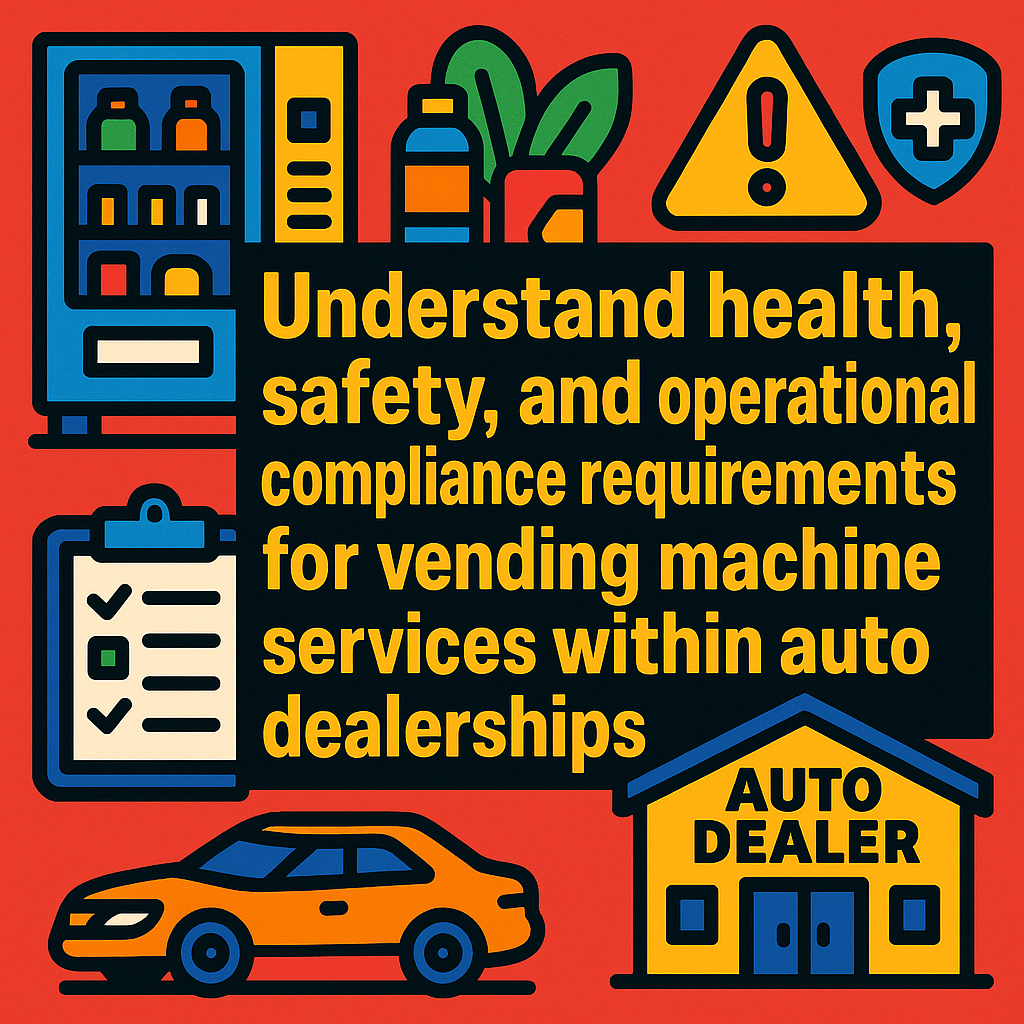Regulatory Compliance for Dealership Vending
Understand health, safety, and operational compliance requirements for vending machine services within auto dealerships.
Back to Vending For Dealerships ResourcesUnderstand health, safety, and operational compliance requirements for vending machine services within auto dealerships.
Back to Vending For Dealerships ResourcesAuto dealerships introduce vending machines to enhance customer and staff experience. However, navigating the various regulatory requirements is critical to avoid pitfalls and ensure smooth operation.
![]() Adhere to health and safety regulations for food items
Adhere to health and safety regulations for food items
![]() Ensure ADA compliance for universal accessibility
Ensure ADA compliance for universal accessibility
![]() Address electrical and fire safety standards
Address electrical and fire safety standards

Auto dealerships are dynamic environments where customer satisfaction and operational efficiency are paramount. Integrating vending services can significantly improve the experience for both waiting customers and busy staff. However, ensuring these vending solutions comply with a myriad of local, state, and federal regulations is crucial. Failing to meet these standards can lead to fines, reputational damage, and even operational shutdowns. Therefore, understanding and implementing robust compliance measures is not just advisable, but mandatory for any dealership considering or currently operating vending machines.
When it comes to vending machines that dispense food and beverages, health and safety regulations take center stage. Dealerships must ensure that all consumables are stored at appropriate temperatures, especially for refrigerated items, to prevent spoilage and bacterial growth. Routine checks of expiration dates and proper product rotation are non-negotiable. Additionally, machines should be regularly cleaned and sanitized to prevent contamination. Local health departments often conduct inspections, so maintaining meticulous records of cleaning schedules and maintenance is vital. For guidance on how to secure your machines and ensure products are safe, consider reviewing practices like Are Vending Machines Safe and Secure?.
Beyond health and safety, accessibility is a key regulatory concern. Vending machines, like all public amenities, must comply with the Americans with Disabilities Act (ADA). This means ensuring machines are reachable by individuals in wheelchairs, with clear signage and easy-to-use controls. Operationally, dealerships need to consider the electrical requirements for vending machines, ensuring they are properly installed and do not pose fire hazards. Furthermore, clear pathways must be maintained around machines, and they should never obstruct emergency exits. Understanding Do Vending Machines Require Special Outlets? can help streamline installation planning. Managing vendor contracts is also part of operational compliance, ensuring terms related to service, restocking, and maintenance are clearly defined. For example, details like How Often Are Vending Machines Refilled? should be explicitly stated.
Environmental regulations and responsible waste management are also increasingly part of compliance landscapes. Dealerships should provide adequate waste bins, and ideally recycling options, adjacent to vending machines to encourage proper disposal of packaging. This not only keeps the dealership clean but also aligns with an eco-conscious business image and potential local ordinances regarding waste segregation. Choosing vending partners who prioritize sustainable practices and offer eco-friendly machine options can further support these goals.
Staying informed about these regulations and partnering with experienced vending service providers are the most effective ways for auto dealerships to ensure their vending solutions are compliant, safe, and beneficial.
Dealerships must comply with local health codes for food handling, storage temperatures, and sanitation, especially for machines offering perishable items. Regular cleaning and maintenance logs are often required.
Yes, vending machines in public-facing locations like auto dealerships must adhere to ADA (Americans with Disabilities Act) guidelines, ensuring accessibility for all customers.
Depending on the location, local and state health departments may require permits or licenses for operating vending machines, particularly if they dispense fresh food or beverages.
Operational compliance includes ensuring machines are properly maintained, regularly stocked, and promptly repaired. Payment systems should be secure and reliable, meeting consumer protection standards.
All perishable items must be stored at correct temperatures and removed before their expiration dates. Strict inventory management is crucial to avoid selling expired or unsafe products.
Yes, all vending machines must meet electrical safety codes, be properly grounded, and not overload circuits. Regular checks by certified technicians are recommended.
Machines should not block emergency exits, fire extinguishers, or sprinkler systems. They should also be placed with adequate ventilation to prevent overheating, as per local fire marshal codes.
Zoning laws can sometimes impact the placement of commercial equipment, especially if machines are located outdoors or visible from public streets. Always check local ordinances.
Dealerships should provide appropriate waste receptacles, and ideally, recycling bins, near vending machines to maintain cleanliness and support environmental regulations.
Partnering with experienced vending service providers who are knowledgeable about local and federal compliance requirements can greatly simplify adherence to regulations.